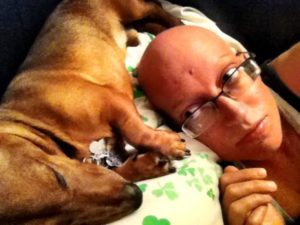 In January, I was diagnosed with recurrent, metastatic, stage 4 breast cancer.
In January, I was diagnosed with recurrent, metastatic, stage 4 breast cancer.
Nine years ago, in Milwaukee, I felt relieved to only be stage 2, to only be halfway. However, from that day until last month, as I sat in a doctor’s office with a view of the Sedona red rocks, I expected stage 4 would someday come.
After the diagnosis, despite my advanced stage, the protocol was familiar: blood work, nurses offering tissues, surgeries planned, oncology designed, my very own copy of a breast cancer handbook. In Milwaukee, after receiving said handbook, I joked, “Does this show me how to use my breast cancer?”
At stage 4, I had no jokes.
Whether for gadgets, furniture or cancer, I haven’t much use for handbooks. There are no instructions on how to grapple with the fear felt by your friends and family. No hacks for what to do about the people who are scared of you now because they’re scared for you. No troubleshooting your own anguish. In this way, the new stage is just like every new stage in life: you must be the cartographer and the navigator.
Two weeks after I was diagnosed with stage 4 cancer, my dog died. (I realize this is starting to sound like an implausibly melodramatic country song, but even the most implausible country songs have origins.)
His name was Bernie. I got him in 2011, just as I began chemotherapy. I’d asked my oncologist if she thought I could outlive a dog, as I didn’t want to saddle family with the burden of having to care for him should I die.
Bernie was not an easy dog. He was often anxious, barked a lot, smelled bad, hated children and strangers, and was prone to biting those he was meeting for the first time. My wife once said if she wrote a breed profile for dachshunds, based on Bernie, the description would read: “Mean, loud, stinks.”
But he was the first dog that was mine. He was good to me, particularly the summer when I was sick and alone in a new city.
He was deeply motivated by food and knew the words “cookie, “chicken” and “hungry” so well I had to spell them out unless I intended to give him a treat.
Bernie liked being sung to, and sometimes, while listening to music, I’d pick him up and strum him like a guitar.
I tried to crate train him, but quickly gave up and allowed him to sleep in the bed with me. Years later, when I got married, my wife and I bought him a big, soft red bed that we kept at the foot of our own. He knew what “red bed” meant and also, “night night time.”
His favorite place was on the couch, on one of our laps, burrowed under a blanket. “Come up on the couch?” we would ask him, and he would cock his head, wait for one of us to lift his low slung body to a place that, in his later years, was difficult for him to reach.
The night he died, Bernie begged for some of the popcorn we were eating and jumped off the couch. This was a frustrating nightly routine—the dog jumping off the couch and needing help to get back on again, repeatedly.
That night, he jumped off the couch and had a massive seizure from which he did not recover. I panicked, tried to get him to snap out of the state, and my wife, with magical calm, felt his abdomen and said, “He’s leaving, honey. Pick him up and hold him.”
Sobbing, I took Bernie into my arms, sat down on the couch and placed him in my lap. He was unresponsive, twitching slightly, his breath becoming shallow. I talked to him for the next five minutes, assured him that he was a good boy. (I didn’t bring up the time he ate Sarah’s new sandals, or the rotisserie chicken carcass that resulted in his hospitalization, or the time he bit the neighbor’s leg so badly she bled.) I told him that I’d miss him and that I loved him, and then, with popcorn in his belly, Bernie died quietly on my lap.
The gut punch of losing Bernie was more destabilizing than that of hearing I had stage 4 cancer. Cancer may put my life on the line, but life is made sweet by the others around whom we live—this includes our people and pets.
On Instagram, after posting about Bernie’s death, a friend commented, “What a magnificent hit.”
I found this phrase perfect: magnificent hit. The magnificent hit of pain when you spill food on the floor and remember you can’t call the dog to help you clean it up, the hit of dog hair on a black hoodie, the hit of a leash on a counter for which you no longer have any use. The magnificent hit of empty food bowls, half chewed rawhide bones, battered toys, the absence of paws on hardwood, of tags jingling, the reflexive wind up of, “I have to stop home to let the dog out,” and then the hit of remembering that you don’t. The hit of nicknames you will never again utter: “quarter-hounder,” “Beansie,” “Bernicles.”
We brought Bernie’s body, wrapped in his favorite soft blanket, to the vet for cremation. There was no handbook because grief is big and sloppy and there is no treatment plan, no dietary advice for prevention, no surgery to inhibit its ability to reach other places.
Grief has no cure. Grief is the tumultuous sea. Mourning is learning how to swim. I’m still learning to swim.
I was hoping I’d have Bernie, silver beard, bad attitude and all, through this next bout with cancer, this next stage, but I’m in a vastly new stage now than when he and I were first acquainted: I’m nearly 10 years older, no longer single, no longer in Wisconsin, not as alone as I was when I first met Bernie. I have a loving spouse, caring students, a remarkable community of friends.
I generally don’t believe platitudes like, “Things happen for a reason,” or, “That which doesn’t kill us…” I don’t even really believe in god. In fact, I believe many life occurrences are senseless and cruel. I do believe, however, in hard, inappropriate laughter, generosity of spirit, in the healing power of art (especially loud music). I believe in black coffee and non-sequiturs and soft blankets. I believe in catharsis. I believe in pets. I believe that life is fundamentally worthwhile and wonderful even when the cancer comes back and the dog dies.

